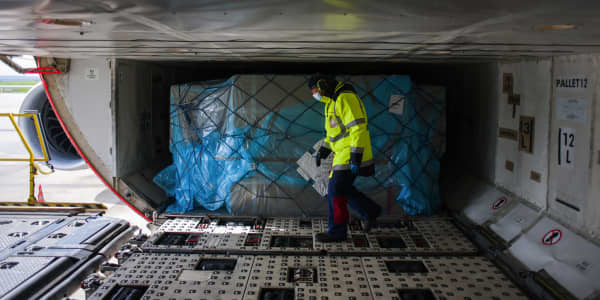DUBAI, United Arab Emirates — One of the top foreign buyers of American-made weapons — the UAE — is investing in a massive effort to build out its own military capabilities.
"We definitely enjoy amazing relationships with many countries in the world, and we have many strong allies that support us in our defense," Faisal al Bannai, CEO of a newly introduced national defense group called Edge, told CNBC's Hadley Gamble at the Dubai Air Show on Sunday.
"But like any nation, at the end of the day, when it comes to its own security, every nation wants to ensure it has sovereignty on very specific security capabilities," he said. "And one area is we are building these capabilities to ensure that (for) critical technologies, UAE has the sovereign capability."
Al Bannai did not indicate how much the UAE is investing in its domestic defense push.
Introduced this month, Edge combines 22 private firms with the government-owned Emirates Defence Industries Company, the Emirates Advanced Investments Group, and Tawazun Holding. It's estimated that 12,000 people will be employed under the defense giant. Al Bannai, formerly a managing director at UAE cybersecurity company DarkMatter, acts as both chief executive and managing director.
Relying less on the US?
The U.S. sells billions of dollars worth of weapons, training and other security assistance to the UAE and its Gulf allies. But it retains tight control over certain technologies — such as lethal drones and the F-35 fighter jet — due to strict U.S. export laws and a long-held policy of giving Israel a "qualitative military edge" in the Middle East.
Defense contracts and deliveries can take years to finalize, and the congressional notification process often stalls or completely prevents an arms sale from taking place. Those factors have likely prompted Gulf countries to invest in developing their own weaponry.
The Edge display at the 2019 Dubai Air Show showcased long-range munitions, bombs and drones including the UAE-made ADASI RW-24 loitering munition, which has a range of about 62 miles and an endurance of over two hours. The drone can be deployed in fewer than 20 minutes, has a cruising speed of 80 miles per hour and weighs less than 100 lbs at launch.
The group's display also featured a machine gun-mounted carbon fiber drone, which Bannai said was a joint effort among many of Edge Group's 25 companies. The group's aim is not only to develop domestic military capability, but also to eventually export weapons. The latter fits with the country's goals of diversifying its economy beyond oil.
Heat from Congress, relief from Trump
The UAE has come under fire from U.S. lawmakers for its role in the war in Yemen, which has seen tens of thousands die and millions pushed to the brink of famine. Congress previously blocked offensive military sales to both the UAE and Saudi Arabia, which has led the Yemen offensive. President Donald Trump bypassed Congress last March to push through an $8 billion weapons sale to Saudi Arabia, the UAE and Jordan, infuriating lawmakers.
And Bannai indicated that the UAE is unlikely to stop buying military weaponry from the United States.
"It's so that we can rely on ourselves for security while still tapping into our partners' and allies' ecosystems for other systems," he said, "because at the end of the day, no one can build everything in that regard. The intention is not to build everything."
The UAE's defense push comes at a time of heightened tensions in the region. Recent months have seen attacks on six commercial tankers in the Persian Gulf, the downing of an American drone, seizures of oil tankers and a major attack on Saudi Arabia's oil infrastructure.
Washington blames the attacks on Iran. Tehran denies that it's responsible.
—CNBC's David Reid contributed to this report.





